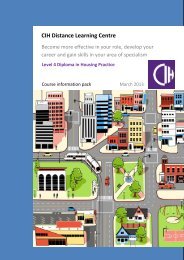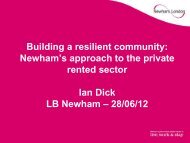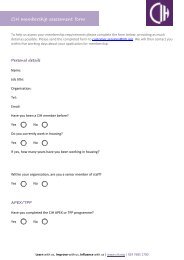View publication - Chartered Institute of Housing
View publication - Chartered Institute of Housing
View publication - Chartered Institute of Housing
You also want an ePaper? Increase the reach of your titles
YUMPU automatically turns print PDFs into web optimized ePapers that Google loves.
TECHNOLOGY AND NETWORKS – TRANSFORMING THE WAY WE LEARN<br />
find knowledge is as important, if not more important than actually knowing it. The<br />
thesis is that digital media has resulted in knowledge being more distributed than ever<br />
and its exponential growth means that individuals must develop personal learning<br />
networks, using online and collaborative tools to develop lifelong learning strategies.<br />
Siemens’ ‘Principles <strong>of</strong> Connectivism’ are:<br />
• Learning and knowledge rests in diversity <strong>of</strong> opinions.<br />
• Learning is a process <strong>of</strong> connecting specialized nodes or information sources.<br />
• Learning may reside in non-human appliances.<br />
• Capacity to know is more critical than what is currently known.<br />
• Nurturing and maintaining connections is needed to facilitate continual learning.<br />
• Ability to see connections between fields, ideas, and concepts is a core skill.<br />
• Currency (accurate, up-to-date knowledge) is the intent <strong>of</strong> all connectivist learning<br />
activities.<br />
• Decision-making is in itself a learning process. Choosing what to learn and the<br />
meaning <strong>of</strong> incoming information is seen through the lens <strong>of</strong> a shifting reality. While<br />
there may be one right answer now, that same answer may be wrong tomorrow.<br />
Connectivism brings a whole new level <strong>of</strong> meaning to what we call Networking. 67<br />
2. 70:20:10 – The 70:20:10 framework is based on research carried out in the 1990s,<br />
which found that lessons learned by successful managers came approximately from the<br />
following sources:<br />
• 70 per cent from real life and on-the-job experiences, tasks and problem solving,<br />
sometimes known as informal learning.<br />
• 20 per cent from feedback and working with or observing role models.<br />
• 10 per cent from courses and reading.<br />
Rather than a prescriptive model, this research demonstrates that we learn most by<br />
doing, and that all aspects <strong>of</strong> learning are important. As work becomes more complex,<br />
it also demonstrates that individuals have to take responsibility for their own learning.<br />
Most organisational interventions focus on courses, coaching and mentoring. This model<br />
suggests that learning and development pr<strong>of</strong>essionals need to respond by facilitating<br />
informal learning, as well as providing traditional products and services. 68 141

















